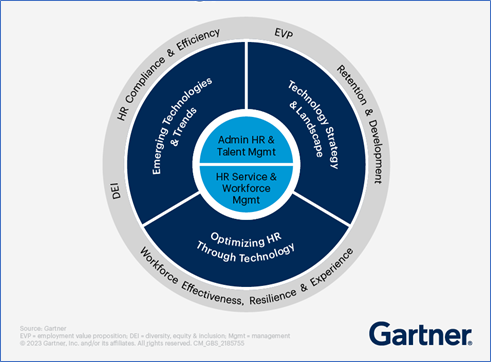Is the HR Function Getting Obsolete – Part II

HR professionals are now expected to focus on industry adaptations by staying abreast of the latest industry trends and challenges. Thissecond partdiscusses the relevance of HR despite pressures.
Pressures andchallenges
So, what are the basicfactors that are threatening the traditional HR role?
- Newer expectations and competencies:In recent years, the role of HR professionals has evolved significantly, with a growing emphasis on their involvement in business operations and strategy functions. HR is now being considered a strategic business partner as organisations recognise the strategic value that HR professionals bring to the table. Their inputs are sought while making business projections and consequently they are expected to be in sync with the long-term goals.Their involvement in business operations and strategy functions has expanded to encompass talent management, culture shaping, and data-driven decision-making. By aligning talent strategies with business objectives, HR professionals contribute directly to the achievement of organisational goals. HR professionals are also involved in workforce planning and analytics. They utilise data and analytics to make informed decisions about workforce needs, succession planning, and performance management. By leveraging technology and data-driven insights, HR professionals can align human capital strategies with overall business strategies, ensuring that the organisation has the right talent in the right place at the right time.
- Digital disruption:Currently, managing remote work motivation and culture is the prime HR issue. Add to it the ever-burgeoning digital disruption due to which HR is now expected to produce more result-based performance analysis than ever before. As we look into the future, workforce management is expected to become increasingly data-driven and dynamic, influenced significantly by technology and shifting societal expectations. With the world growing more interconnected and diverse, the global talent pool is becoming readily accessible. Future workforce management will need to embrace this diversity, ensuring inclusion at every level. This transformation will be characterised by a marked focus on flexibility, inclusivity, and personalisation.
- Automation and Outsourcing:Outsourcing support functions like HR was inevitable ever since human resources began using more tech. This had happened to the Accounts and Finance department long ago. Big-to-medium organisations now outsource almost all finance-related tasks to third-party vendors. The employees just need to interact with an online portal to get all issues resolved. In a similar vein, in-house HR departments are evolving as more and more digital HRMS solutions roll out every day. They support the HR professionals in their daily tasks, but that is exactly the reason that allows a reduction in HR manpower. Just like Accounts and Finance, online HR solutions lead to employee independence. Nearly every HR-related process has been automated and self-service portals have become all the rage, with employees getting things done on their own through automated data systems. Outsourcing this entire solution package to specialised third-party vendors is only the next logical step.
- Adapting to new industry requirements:The new post-pandemic reality has forced HR to rethink all the ‘best practices’ they knew of so far. The business conditions are highly different from ever before and most predicted trends have become non-existent. HR professionals are now expected to focus on industry adaptations by staying abreast of the latest industry trends, challenges, competitors, and business operations to fully evaluate the future and act accordingly. By focusing on industry adaptations, HR professionals can position themselves as valuable strategic partners who drive organisational success by ensuring that the workforce is equipped with the skills, knowledge, and capabilities required to thrive in a rapidly changing business landscape.

Image: Human Capital Management technology transformation; Source: Gartner
Why HR matters
But can HR be replaced straightaway by new tools and work processes?No one is bold enough to agree to that yet.Shedding HR workers is trickier than a typical corporate cull. For starters, they’re intimately familiar with the company’s internal policies and procedures, so the process must be executed to the letter. Also, the person delivering the bad news isn’t just some unknown HR rep, but a trusted colleague and perhaps even a friend. And cutting the HR function too deep could create problems later on if only a skeleton crew remains when business conditions improve. In some cases, entire HR departments are eliminated, creating a bizarre phenomenon where the last remaining staffer has to lay themselves off.
Let us take a look at the reasons for which the HR Department still holds value and relevance:
- Strategic value:While some administrative tasks have been automated, the strategic value of HR remains indispensable. HR professionals play a vital role in designing and implementing talent management strategies, fostering employee engagement, and nurturing organisational culture. In an era where talent acquisition and retention are critical for success, HR professionals are instrumental in attracting top talent and creating an environment that fosters employee growth and development.
- CatalysingEmployee Experience:Employee experience has gained significant importance in recent years. HR professionals play a crucial role in ensuring that employees feel valued, supported, and motivated. They are at the forefront of initiatives such as employee wellness, diversity and inclusion, and work-life balance, all of which contribute to a positive employee experience. With the rise of remote work and the gig economy, HR plays a pivotal role in managing the complexities of a diverse and dispersed workforce.
- Data-driven decision-making:One area where HR has evolved is in leveraging data analytics to drive decision-making. With the availability of vast amounts of employee data, HR professionals can now make evidence-based decisions regarding talent acquisition, performance management, and employee engagement. By analysing data, HR can identify trends, predict future needs, and develop strategies that align with organisational goals. The ability to harness data effectively is a critical skill for HR professionals in the modern workplace.
- Strategic partnerships:Another aspect that highlights the continued relevance of HR is its role as a strategic partner to business leaders. HR professionals collaborate with senior management to align HR strategies with overall business objectives. They provide insights and expertise on workforce planning, change management, and organisational development. By understanding the business context and contributing to strategic decision-making, HR professionals can ensure that the organisation’s human capital is optimised for success.
Part 3 will discuss some specific skills that HR professionals should focus on to stay relevant in an uncertain future.
[To be concluded]


